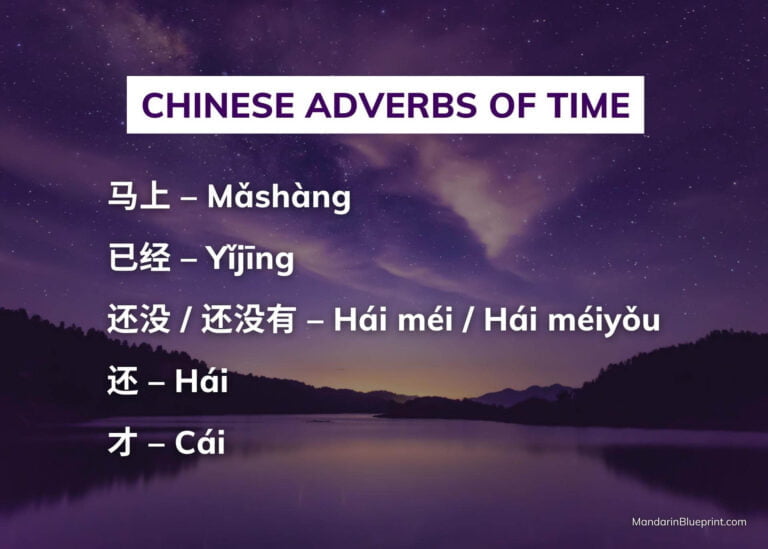Guide to Chinese Adverbs of Time

In Mandarin, the role of Chinese adverbs of time isn’t just fundamental; it’s fascinating. These adverbs act as keys that unlock the mysteries of time, telling us precisely when an action or event occurs. They’re not mere markers of time; they’re the pulse of narratives and conversations.
Our exploration today gets into the heart of these temporal adverbs. From the commonly used 明天 míngtiān (“tomorrow”) and 昨天 zuótiān (“yesterday”) to the less frequent but equally intriguing 后天 hòutiān (“the day after tomorrow”), each adverb holds a unique place in the rhythm of Mandarin speech.
As we list and dissect these adverbs, we’ll discover how they beautifully align with Mandarin’s Subject-Verb-Object (SVO) structure, a point of familiarity for those acquainted with English yet with its unique nuances.
This is your guide through the world of Chinese adverbs of time. Here, you’ll not only learn about their meanings but also see how they are intricately woven into the language to provide clear, temporal context in every sentence. So, whether you’re a language enthusiast or a Mandarin learner, join us on this journey to understand and appreciate the elegant simplicity and complexity of these Chinese adverbs of time.

马上 – Mǎshàng
The Chinese expression 马上 (Mǎshàng), literally translated as “on the horse,” reflects a vivid historical context. In Ancient China, this phrase was used literally to describe someone already mounted on a horse and so poised to depart or arrive imminently. This usage resonated in scenarios involving messengers or even armies, as their being “on the horse” signified urgent movement or action.
In contemporary Mandarin, 马上 has transcended its literal meaning and is now an adverb of time, indicating immediacy or promptness. It’s used to modify verbs, suggesting that the action is about to happen in the very near future.
For instance, in the sentence 演出马上就要开始了 (Yǎnchū mǎshàng jiùyào kāishǐ le — “The performance is about to start immediately”), 马上 is placed before the verb phrase 就要开始了 (jiùyào kāishǐ le — “is about to start”), indicating the action’s immediacy.
There are other adverbs in Mandarin that convey urgency or immediacy, such as 立刻 (lìkè — “immediately”) or 立即 (lìjí — “right away”). Each of these has its nuances and contexts, but 马上 is perhaps the most colloquially versatile.
So, 马上 (Mǎshàng) is more than just an adverb of time; it’s a linguistic bridge between ancient and modern Chinese, reflecting both the cultural evolution and the practicalities of modern communication. Its use in Mandarin sentences shows the language’s structure and the importance of context in understanding and applying grammatical principles.
Related Reading: Complete Guide to Time in Chinese
已经 – Yǐjīng
已经 (Yǐjīng) functions similarly to “already” in English and is used to indicate that an action or state has been completed before the time of speaking. It’s a crucial element in Mandarin grammar for expressing past actions with present relevance.
In Mandarin sentence construction, 已经 typically precedes the verb or verb phrase. For example, in “这种样子的包已经卖完了” (Zhè zhǒng yàngzi de bāo yǐjīng mài wán le — “This type of bag is already sold out”), 已经 is placed before the verb phrase 卖完了 (mài wán le — “sold out”), emphasizing the completion of the action.
已经 can be used to express straightforward facts, as in the above example. But it’s also employed to convey emotions such as surprise, disbelief, or relief. In “我不敢相信他们已经分手了” (Wǒ bùgǎn xiāngxìn tāmen yǐjīng fēnshǒule — “I can’t believe they already broke up”), the use of 已经 emphasizes the speaker’s surprise or disbelief at the rapid development of events.
已经 (Yǐjīng) is a versatile and essential adverb of time in Mandarin Chinese, integral to expressing completed actions and emotional responses to these actions. Its proper usage is key to mastering Mandarin’s sentence structure and effectively communicating temporal nuances in the language.
还没 / 还没有 – Hái méi / Hái méiyǒu

Both 还没 (Hái méi) and 还没有 (Hái méiyǒu) are used to indicate that something hasn’t happened up to the present moment or the time being discussed. They are the negation of 已经 (Yǐjīng), which means “already.” These adverbs of time are crucial in Mandarin for expressing the non-occurrence of an action or state.
Consistent with Mandarin’s SVO structure, 还没 and 还没有 typically precede the verb or verb phrase they modify. For example, in “小婉已经三十多岁了,但还没结婚” (XiǎoWǎn yǐjīng sānshí duō suì le, dàn hái méi jiéhūn — “Xiao Wan is already in her thirties, but she isn’t married yet”), 还没 is placed before the verb 结婚 (jiéhūn — “marry”), indicating that the action of marrying has not yet occurred.
还没 and 还没有 are commonly used to express a delay in an expected action or situation. They can also imply an expectation that the action might occur in the future. This usage is particularly common in everyday conversation and narrative, providing a nuanced way to discuss actions or events that are anticipated but have not yet taken place.
The use of 还没 and 还没有 reflects the Mandarin language’s emphasis on temporal precision and the state of actions. This aspect of Mandarin adverbs of time is essential for effective communication, especially in contexts where the timing and progression of events are significant.
Related Reading: Achieving Mastery in Chinese Vocabulary
还 – Hái
还 (Hái) is primarily used to denote the continuation of an action or state. It’s equivalent to “still” in English and is vital in Mandarin for indicating that something is ongoing. This adverb is particularly useful in expressing duration and persistence.
In Mandarin sentences, 还 typically precedes the verb or verb phrase it modifies. For instance, in the sentence “虽然很晚了,但他还在学习” (Suīrán hěn wǎn le, dàn tā hái zài xuéxí — “Even though it’s late, he’s still studying”), 还 is placed before the verb phrase 在学习 (zài xuéxí — “studying”), emphasizing the ongoing nature of the action.
还 can also be used in various contexts to indicate that something is still the case or an action is still taking place. It is often paired with 在 (zài) when used with action verbs to emphasize the continuity of an action.
While 还 (hái — “still”) indicates ongoing action, other adverbs like 刚刚 (gānggāng — “just now”) or 已经 (yǐjīng — “already”) are used to discuss recent or completed actions. Understanding these differences is crucial for accurately conveying the timing and progression of events in Mandarin.
才 – Cái
The adverb 才 (Cái) is used to emphasize the recentness of an action. It’s similar to saying “just now” or “only recently” in English. This Chinese adverb is particularly useful for highlighting the immediacy or the unexpectedly recent nature of an event or action in Mandarin.
才 can be used to express surprise, frustration, or disappointment about the timing of an action. It often carries a connotation that the action occurred later than expected or desired. This makes it a useful adverb for expressing nuanced emotional responses related to the timing of events.
Take, for instance, the sentence ‘他八点才到’ (Tā bā diǎn cái dào), which translates to ‘He didn’t arrive until eight o’clock.’ In this example, 才 (cái) is crucial in conveying not just the time of arrival but also the implied lateness of it. The use of cái here suggests that the arrival at eight o’clock was delayed or beyond the expected time, offering a subtle yet significant insight into the speaker’s perspective.
This nuanced use of 才 (cái) exemplifies how Chinese adverbs of time can enrich a sentence, providing depth and context to the narrative of timing in Mandarin communication.
Understanding 才 in relation to other time adverbs like 刚刚 (gānggāng — “just now”) or 已经 (yǐjīng — “already”) is important for accurate expression in Mandarin. While 才 emphasizes the recentness of an action, often with a nuance of lateness or unexpectedness, 刚刚 is a neutral expression for recent actions, and 已经 indicates that an action has already been completed.
The power of time in language
As we finish our exploration of Chinese adverbs of time, it’s clear how these linguistic gems not only shape the structure of Mandarin sentences but also enrich our understanding of time’s nuances in language. From 马上 (Mǎshàng), encapsulating immediacy, to 才 (Cái), highlighting recent actions, each adverb offers a unique window into the Mandarin mindset, blending historical richness with contemporary relevance.
Yet, mastering these adverbs is just the beginning. The beauty of Mandarin extends far beyond its temporal expressions. To truly grasp this intricate language, a deeper dive into its grammar, vocabulary, and cultural context is essential. And here’s where your journey to fluency takes a pivotal turn.
Are you inspired to learn Mandarin faster and with greater ease? Do you want to unlock the full potential of your language skills? Take the first step now by completing the FREE Mandarin Fluency Scorecard. This quick and comprehensive assessment will gauge your current Chinese proficiency and provide you with a tailored guide to achieving fluency.
Why wait? Quickly understand what’s holding you back and how to overcome it.
Learn Mandarin more efficiently by focusing on what matters most to you. It’s FREE, easy, and takes less than 60 seconds. Begin your assessment and receive immediate, actionable insights. Don’t just learn Mandarin. Master it with the right tools and guidance. Your journey to fluency starts now!








